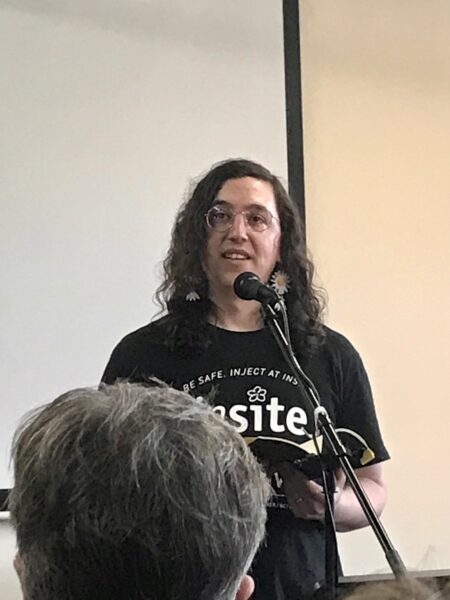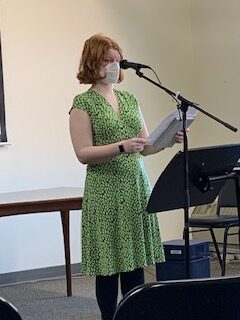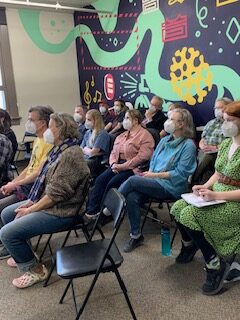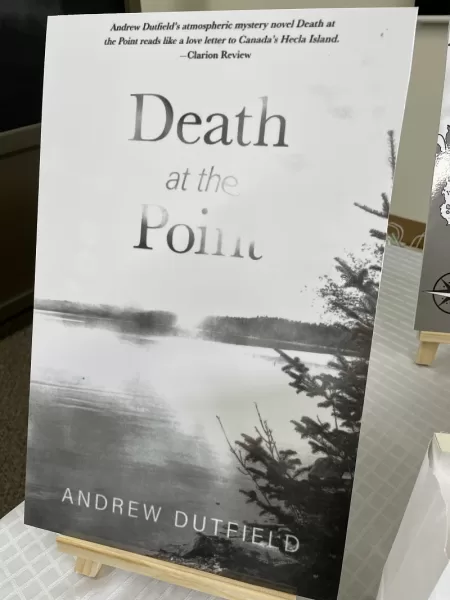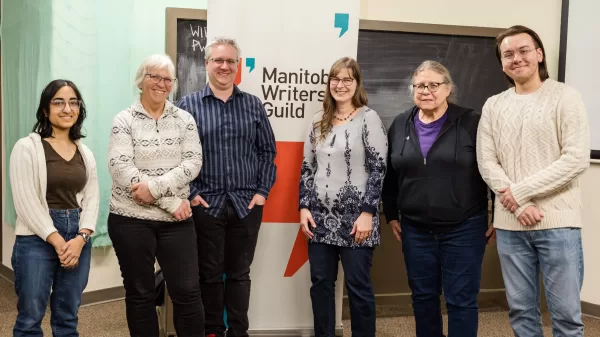The topic of plagiarism reared its ugly face during one of our recent Rants and Ramblings sessions. A participant described how a book she had submitted to Amazon had been duplicated word for word and was selling right alongside of hers. Some additional discussion revealed that this was becoming a common problem and it appeared this duplication was not performed by a person but rather by a system, perhaps an AI (Artificial Intelligence) program specifically designed to find books on Amazon, duplicate them in just the right manner that the plagiarism would not be immediately detected, and then list them for sale.
At that time, Susan Rocan, our moderator for the evening, revealed that the Guild had already been discussing AI as a threat to legitimate writers and that they were hopeful they might arrange a presentation by Den Valdron, a lawyer, a prolific writer and a lecturer on AI issues. That presentation occurred on March 9 at ArtSpace.
Mr. Valdron presented himself as a man that speaks his mind. He opened his presentation with an apology that he could be “mean” and that he would likely disclose things our group would not enjoy hearing. There was no doubt that Mr. Valdron was there to deliver what he believed to be the truth about AI as clearly and boldly as possible. For this participant it was refreshing to hear from a speaker that was not understating the seriousness of an issue just to appease his audience.
Mr. Valdron began his lecture by saying that AI was in fact not intelligent and not sentient. It is simply a mechanism that collects data, a process commonly called “scraping”, and then sorts and averages out that data to produce output. It repeats this operation endlessly attempting to achieve an output that fits a particular problem.
At the time of the lecture Mr. Valdron felt that AI programs were crude and unreliable. In many cases, AI programs will produce what are called “hallucinations”, results that are completely invalid and sometimes problematic. As an example he offered, “Imagine you download a document about edible mushrooms that was produced by AI that inadvertently includes a few deadly varieties. Using that document as a guide could literally kill you.” AI programs are also subject to biases. For example if you asked an AI program to define whether a man or a woman would make a better CEO, the program might be biased toward men based on scraping historical data that included more examples of men as CEOs than women.
Although AI may not be intelligent and may not be able (yet, at least) to replicate the styles and creative thought of human writers, its deadly power resides in its ability to perform these tasks repeatedly at incredible speed and for almost no cost. A capable human writer might produce a far better story than AI, but whereas the human writer might expend dozens or even hundreds of hours to do so, an AI program could produce a thousand versions of that same story in seconds, and one or two of those might be reasonably comparable to the human version. In today’s world where price so often rules over craftsmanship, this can result in an environment of unreasonable competition for writers.
The good news is that AI productions cannot currently be copyrighted, and copyrights can protect legitimate writings from duplication and even scraping. The bad news is that it is expensive and difficult to prove AI duplication of copyrighted materials, so even when legitimate writers encounter these violations of their work there is often little they can do about it. To make this even worse, style cannot be copyrighted so that AI programs that do not exactly duplicate a person’s writing or perhaps a musician’s song outright, they can duplicate the style without any legal ramifications and produce surprisingly similar products.
Today AI is branching into virtually every element of human life. Photographs of Donald Trump standing alongside Afro-American folks that are AI inserted, AI generated pictures of Taylor Swift engaged in pornographic situations, and AI replications of famous paintings are proliferating across the Internet with virtually no oversight or acknowledgement of their lack of authenticity. Coming a bit closer to home, the question was raised as to how long will it be before writing contests, such as are sponsored by the Manitoba Writers’ Guild, will be inundated by AI-generated writings.
The issue is complex and serious, and as the technology evolves the threat to creative workmanship, whether it be in literature, music or art, will only increase. Mr. Valdron’s best advice was for folks to be watchful and speak out loudly when they see AI violations. We need to encourage lawmakers to recognize AI for the threat that it is and to provide legal recourse for victims that is effective and affordable.
In wrapping up, Mr. Valdron provided some conclusions that were simultaneously optimistic and disheartening. At the moment it is not difficult to delineate between AI writing and human writing, so there is a window for all of us in which we can continue to feel safe with our craft. For his personal purposes, he is looking to the next five years in which he hopes to complete another twenty books, many of which are already in development. Beyond that, the future of creative writing in the face of AI is anyone’s guess.


